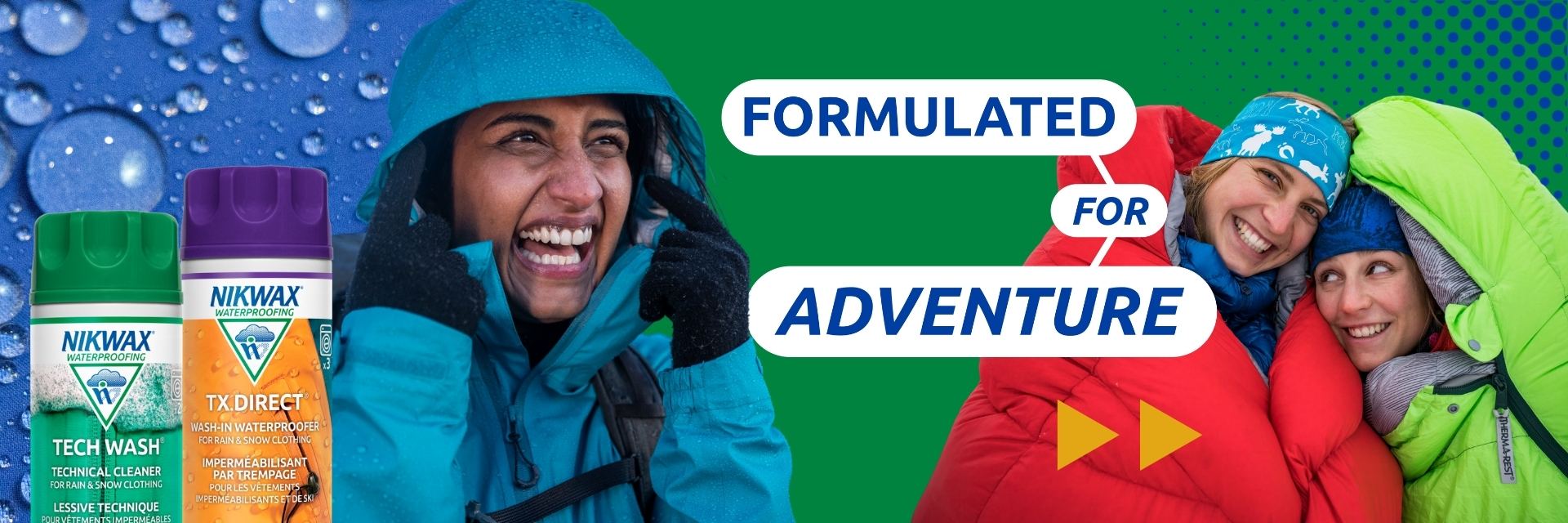
Our PFAS-free range is expertly ‘Formulated For Adventure.’ Nikwax products clean, waterproof, and deodorize your cherished outdoor clothing and gear, helping you enjoy your chosen activity outdoors, embrace the weather, and stay out longer.
PFAS-free and aerosol-free since 1977!
Our Product Areas
Waterproofing
Care products that extend the life and enhance the performance of waterproof outdoor gear.
Deodorizing
Care products that eliminate odors and enhance the performance of fitness clothing and footwear.
Industrial Solutions
PFAS-Free waterproofing solutions for outdoor and fashion clothing brands and manufacturers, commercial laundries, repair centers and much more.
-

Stain Scrub
$10.45A technical pre-wash stain treatment for waterproof and insulated clothing and gear. Designed to be used with Nikwax cleaning and waterproofing products.
Select options This product has multiple variants. The options may be chosen on the product page -

Footwear Refresh
$8.35Powerful deodorizing cleaner designed to freshen and prevent odor build-up in all non-waterproof footwear, insoles, and footbeds. Easy to use by hand.
Select options This product has multiple variants. The options may be chosen on the product page -

Wetsuit Refresh
$17.80Powerful cleaner designed to deodorize, condition, and remove contaminants from wetsuits and neoprene items. Easy to use by hand.
Select options This product has multiple variants. The options may be chosen on the product page
Freshen Up Your Gear!
Active clothing and footwear gets stinky. New Nikwax Refresh products provide high powered cleaning and deodorizing to keep your gear fresh.
How to use Nikwax
Learn how to clean, waterproof and condition all your outdoor clothing, footwear and equipment.
Watch our collection of ‘how-to’ videos which show how you can easily keep your gear performing better for longer. Nikwax products keep you warm, dry and comfortable – and save you money!
Learn how to clean and re-waterproof your rain and snow jackets.
Revitalize your Down Gear in your washing machine with Down Wash Direct and Down Proof
Recent Posts
Best Sellers
-

Tech Wash®
Price range: $11.50 through $125.95Market leading cleaner designed to revitalize water repellency and breathability of waterproof gear. Easy to use in your washing machine or by hand, non flammable and PFAS-free.
Select options This product has multiple variants. The options may be chosen on the product page -

Hardshell DUO-Pack
Price range: $24.10 through $56.65The complete care system for thoroughly cleaning, enhancing water repellency, and revitalizing the breathability of wet weather clothing. Easy to use in your washing machine and by hand, non-flammable and PFAS-free.
Select options This product has multiple variants. The options may be chosen on the product page -

TX.Direct® Spray-On
Price range: $16.75 through $45.10The high performance waterproofer designed to enhance performance and revitalize the breathability of waterproof clothing with wicking liners. Easy to apply by hand, non flammable, PFAS and aerosol free.
Select options This product has multiple variants. The options may be chosen on the product page -

TX.Direct® Wash-In
Price range: $15.70 through $160.60The high performance waterproofer designed to enhance performance and revitalize the breathability of waterproof clothing. Easy to use in your washing machine or by hand, non flammable and PFAS-free.
Select options This product has multiple variants. The options may be chosen on the product page




